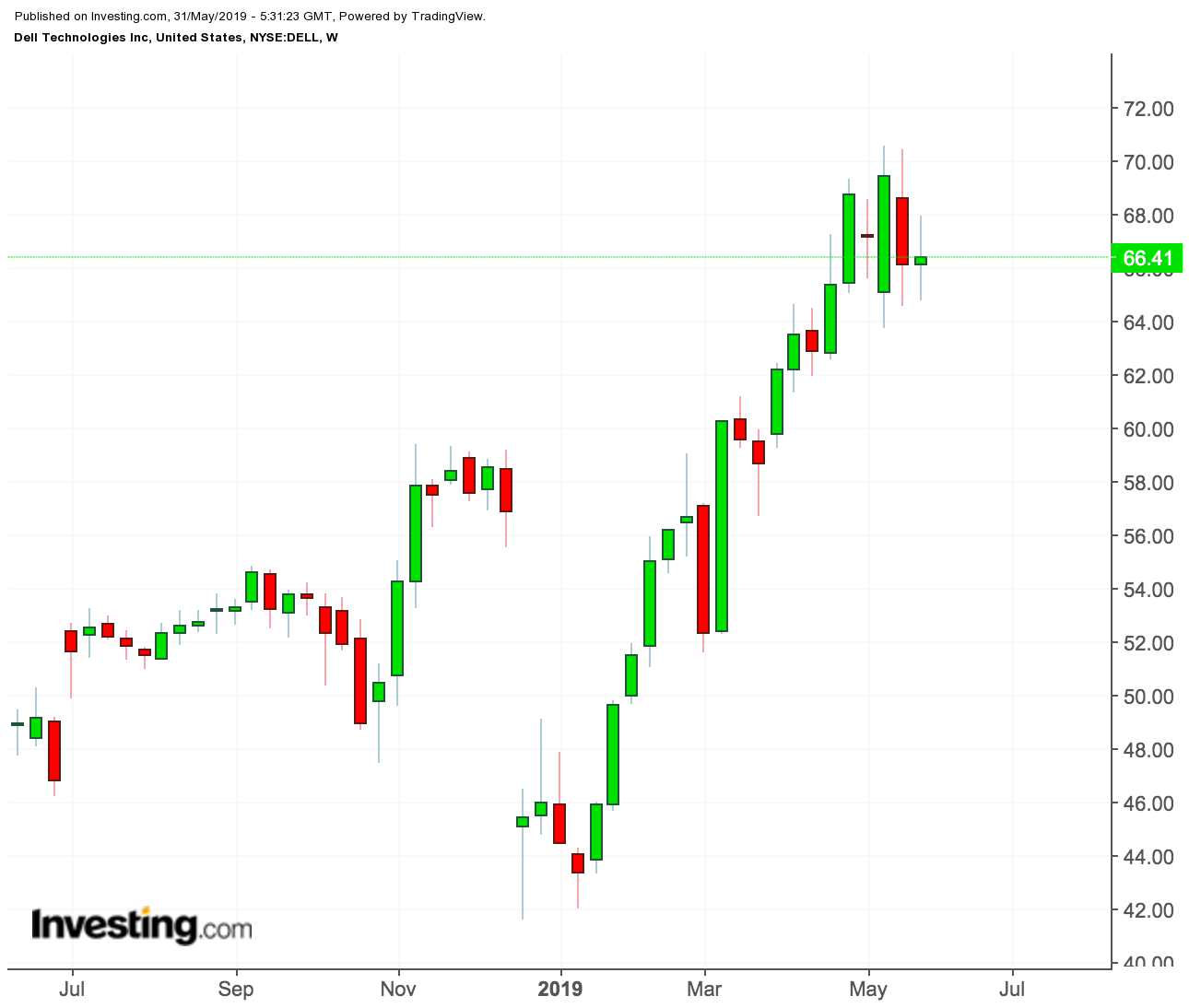The computer hardware sector is not the place to be in when the world’s largest economies — the U.S. and China — are embroiled in a bitter trade dispute that could derail global economic growth and crimp spending by both consumers and large corporations.
Amid this uncertainty, however, there is one stock which is holding up surprisingly well. And that’s the re-born Dell Technologies Inc (NYSE:DELL). After re-listing on the New York Stock Exchange in December, its shares have climbed more than 45%, compared with just 9% gains delivered by the close rival, Hewlett Packard Enterprise Co (NYSE:HPE). Dell stock closed up 0.3% at $66.41 yesterday.

So, what is it that’s making investors excited about Dell this time? Dell went private in 2013 to transform its business from a hardware seller to a diversified company which could command a significant market share in the growing areas of the digital economy, including storage, servers, data protection and networking.
Just before its re-entry in the public market last year, Dell merged with EMC Corp (NYSE:EMC), forming a tech powerhouse with annual sales forecast to touch $95 billion in the current fiscal year, compared with about $57 billion when it left the public stage. At that level, Dell would rank as the fifth-largest publicly traded tech company in the U.S. by annual revenue, just below Microsoft (NASDAQ:MSFT).
Bigger Dell Is More Powerful
The lynchpin of founder and CEO Michael Dell's strategy has been to create an integrated operations company that could engage customers from one unit to another and drive higher sales and profit, to compensate for Dell’s lower-margin businesses. The addition of EMC’s higher-margin data storage business is providing cross-selling opportunities, while its 82% stake in VMware, which provides digital infrastructure to over 500,000 customers globally, is adding to its bottom-line.
The latest evidence of this strength came yesterday when Dell reported its latest quarterly earnings, surpassing Wall Street's EPS estimates. Helped by strong corporate demand for personal computers and services, Dell’s profit rose to $1.45 a share, excluding one-time items, from the consensus forecast of $1.20 a share. Sales from the PC unit rose 6.2% to $10.9 billion, while corporate sales surged 13% on the rising demand for its subscription services for PCs.
Dell’s bigger size and diversified offerings didn’t come without a cost though. Some analysts have raised concerns about the massive debt on the company's balance-sheet, which ballooned to $49 billion after its acquisitions. That indebtedness isn’t a problem when the sales are rising and the company is making profit. But computer hardware is a highly cyclical business that could face a sharp slowdown if the economy slows or trade tariffs escalate costs for consumers.
In its forecast for fiscal 2020, Dell had warned that sales growth will slow over the next year, hurt by global economic issues that may weaken corporate demand for its hardware products.
These concerns, as well as the company’s integration, which is still a work-in-progress, have kept its valuations depressed. The stock is trading at just nine times the earnings estimates for fiscal year 2021, a discount from the industry’s average P/E multiple of 14.
Bottom Line
There are more reasons to like Dell stock than to hate it after the company's restructuring and expansion. With its market leading positions in many product categories, Dell’s new business mix is much more powerful. It can now withstand the cyclical headwinds better than many of its competitors, who are heavy on the hardware side.
But, after a powerful rally, the stock is very much reflecting these dynamics in the short-run. Over the long-run we feel the positives far outweigh the negatives, making Dell an attractive addition in any portfolio when the pricing becomes favorable.
